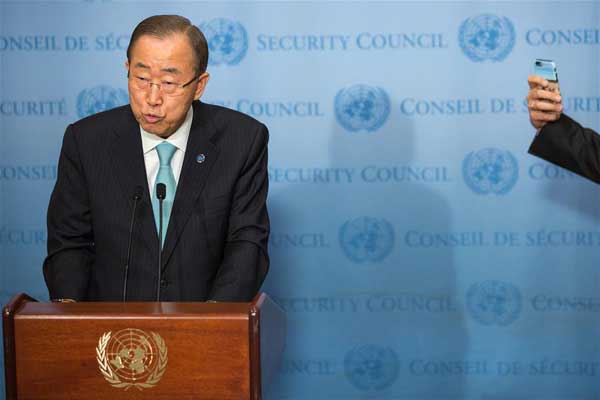UN chief slams killing of two UN Chinese peacekeepers in South Sudan fighting
 |
|
United Nations Secretary-General Ban Ki-moon addresses the press on the on-going situation in South Sudan, at the UN headquarters in New York, the United States, July 11, 2016. [Photo/Xinhua] |
UNITED NATIONS - UN Secretary-General Ban Ki-moon on Monday condemned the killing of two Chinese peacekeepers in renewed fighting between South Sudan's rival army factions in capital Juba.
"I condemn the killing of two Chinese peacekeepers and one UN national staff," the secretary-general told reporters here. "Let me start by expressing my deep condolences to the families and loved ones of all those who have been killed in the fighting that has consumed Juba over the past four days."
"Many people have been killed in heavy fighting. There are growing fears that many more could die in another round of violence," Ban said.
"The renewed fighting is outrageous. It is yet another grievous setback. It deepens the country's suffering," he said. "It makes a mockery of commitments to peace."
The UN mission in South Sudan on Monday reported heavy fighting in Juba, including in areas close to its compounds in Jebel and Tomping.
The latest round of violence followed deadly clashes between the rival factions on Friday and Sunday in the capital city.
South Sudan's Health Ministry says at least 271 people were killed in Friday's clashes. The exact number of those killed in fighting since Sunday is not known. On Sunday, the UN Security Council said in a press statement that the 15-nation UN body "condemned in the strongest terms the escalation of fighting in Juba," and they expressed their sympathies and condolences to the families of Chinese peacekeepers who were killed or injured in the attacks.
South Sudan has canceled this year's independence celebrations due to the economic crunch resulting from more than two years of civil conflict. It won independence on July 9 2011 from Sudan after more than two decades of war that ended in a bitter divorce.
The country again plunged into conflict in December 2013 after President Salva Kiir accused his deputy Riek Machar of plotting a coup, which the latter denied, leading to a cycle of retaliatory killings.
President Kiir and former rebel leader and now First Vice President Machar signed a peace deal in August that paved way for the formation of the transitional unity government to end more than two years of civil conflict.





















